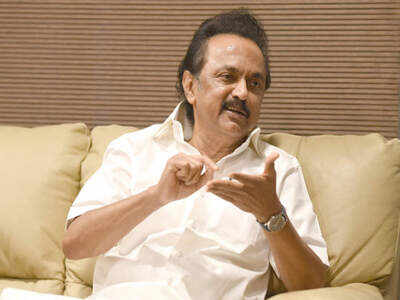
CHENNAI: DMK president M K Stalin on Saturday urged Prime Minister Narendra Modi to defer implementation of the National Education Policy 2020 (NEP) as it needs to be redrafted after a consultative process to discuss various issues regarding stakeholders from all states.
Stalin demanded that the Centre reinstate a consultative process to bring all relevant stakeholders from the states and the Centre on board to discuss and critically analyse the policy and redraft the NEP 2020.
He wanted the government to take NEP through a parliamentary session to reaffirm the country’s parliamentary democracy, federalist governance and ensure inclusiveness.
“I urge you to halt the decision to implement NEP until the situation is conducive to follow the due processes enshrined in our Constitution,” Stalin said.
Stalin said while the country is reeling from the impacts of Covid-19 and the economy is stagnating, unilateral decision to approve NEP 2020 without a discussion or deliberation in parliament undermines the foundational principles of our democracy.
“The proposed policy threatens the progress made in educational attainment, access and quality in the country by undermining not just the authority of states but also setting up additional barriers to social justice and equity in our country,” the party chief said.
He said the three-language formula in the policy would impose severe burden on children. “Sanskrit as a compulsory option at all levels of education cannot be accepted,” he added.
Stalin also opposed assessment of classes III, V and VIII and semester exams for high school students along with existing Class X and XII grade. He opposed the entrance exams for all disciplines in college.
“The NEP has less provision for increasing the female enrolment ratio in the school and higher education system. The structure of having multiple assessments will act only as an obstacle for a girl child,” he said.
He noted that the policy had no mention of reservation for socially backward communities. Stalin accused the policy for giving importance to vocational courses.
“It is another way to promote ‘Kulakkalvi Thittam’ education, which was abolished in Tamil Nadu due to its failure in early stages of implementation,” he said.
He also opposed merging government schools, technology assisted online learning, over centralised regulatory system, preference for private participation and merger of autonomous institutes.
Stalin demanded that the Centre reinstate a consultative process to bring all relevant stakeholders from the states and the Centre on board to discuss and critically analyse the policy and redraft the NEP 2020.
He wanted the government to take NEP through a parliamentary session to reaffirm the country’s parliamentary democracy, federalist governance and ensure inclusiveness.
“I urge you to halt the decision to implement NEP until the situation is conducive to follow the due processes enshrined in our Constitution,” Stalin said.
Stalin said while the country is reeling from the impacts of Covid-19 and the economy is stagnating, unilateral decision to approve NEP 2020 without a discussion or deliberation in parliament undermines the foundational principles of our democracy.
“The proposed policy threatens the progress made in educational attainment, access and quality in the country by undermining not just the authority of states but also setting up additional barriers to social justice and equity in our country,” the party chief said.
He said the three-language formula in the policy would impose severe burden on children. “Sanskrit as a compulsory option at all levels of education cannot be accepted,” he added.
Stalin also opposed assessment of classes III, V and VIII and semester exams for high school students along with existing Class X and XII grade. He opposed the entrance exams for all disciplines in college.
“The NEP has less provision for increasing the female enrolment ratio in the school and higher education system. The structure of having multiple assessments will act only as an obstacle for a girl child,” he said.
He noted that the policy had no mention of reservation for socially backward communities. Stalin accused the policy for giving importance to vocational courses.
“It is another way to promote ‘Kulakkalvi Thittam’ education, which was abolished in Tamil Nadu due to its failure in early stages of implementation,” he said.
He also opposed merging government schools, technology assisted online learning, over centralised regulatory system, preference for private participation and merger of autonomous institutes.

Coronavirus outbreak
Trending Topics
LATEST VIDEOS
City
 Kozhikode air crash: Digital flight data recorder, cockpit voice recorder recovered, says Civil Aviation Minister
Kozhikode air crash: Digital flight data recorder, cockpit voice recorder recovered, says Civil Aviation Minister  Kerala air crash: What actually happened at the Kozhikode airport yesterday
Kerala air crash: What actually happened at the Kozhikode airport yesterday  Tabletop Kozhikode airport is a high-risk landing tarmac: What makes such airports vulnerable?
Tabletop Kozhikode airport is a high-risk landing tarmac: What makes such airports vulnerable?  Eyewitnesses at Kozhikode International Airport recount the moment the Air India Express flight from Dubai crashed
Eyewitnesses at Kozhikode International Airport recount the moment the Air India Express flight from Dubai crashed
More from TOI
Navbharat Times
Featured Today in Travel
Get the app





